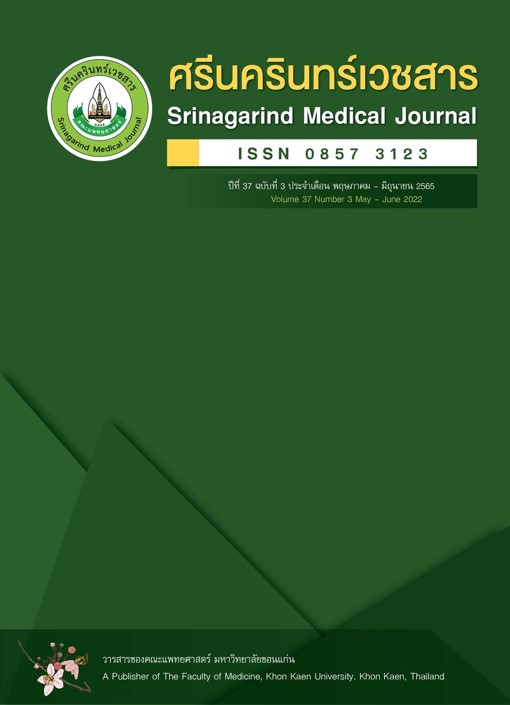RETRACTED ARTICLE: The Effect of Applying a Chronic Care Model in Patients with Uncontrolled Hypertension and Type 2 Diabetes Mellitus on Delaying Chronic Kidney Disease Progression in Primary Care, Ubon Ratchathani Province
Keywords:
Chronic Care Model, Uncontrolled HT and DM Type 2, Chronic Kidney DiseaseAbstract
Background and Objective: Patients with uncontrolled hypertension (HT) and type 2 diabetes (T2D) increases risk for kidney disease. The purpose of this study was to study the effect of applying a chronic care model in patients with uncontrolled hypertension and diabetes mellitus on delaying chronic kidney disease progression in primary care.
Methods: This study was a randomized controlled trial. The sample consisted of patients with uncontrolled HT and T2D in primary care and selected by random. They were divided into experimental group and control group of 50 persons each. A chronic care model was applied for 8-month follow-up. The intervention included caring by multidisciplinary team, database for patient problem on case management, educating and building skills for self-management. Evaluated by using the self-management behavior scale to delay chronic kidney disease, clinical outcomes, and quality of life measure. Data were analyzed using descriptive statistics. chi square and
independent t-test.
Results: At the end of the study, the experimental group had statistically significant higher score of self-management behavior, glomerular filtration rate and quality of life and had statistically significant lower blood pressure level and HbA1c than the control group (p<.05).
Conclusion: Chronic disease care model affects self-management behaviors, clinical outcomes, and quality of life of patients with uncontrolled HT and T2D improved.
References
Division of Non-Communicable Diseases, Department of Disease Control. NCDs situation report
diabetes, hypertension and related risk factors 2019. Nonthaburi: Aksongraphic and design, 2020.
Wongprakob N, Piyabunditkul L. Predictive factors of chronic kidney disease in patients with diabetes mellitus
and hypertension. JBCNM 2017;23(2):94-106.
Diabetes Association of Thailand. Guidelines for diabetes 2017. Pathum Thani: Romyen Media Co., 2017.
Khochaseni P, TrakanWanich T, Wari Sangthip K. Nephrology board review 2014. Bangkok: Text and
Journal Public Limited, 2014.
Subramanyam KS, Gosavi S, Tenneti D, Murgod R. Evaluation of the role of HbA1c in chronic kidney
disease. J Clin Diag Res 2018; 12(7): BC01-BC04.
Kantachuvessiri S, Chancharoenthana W, Kiatsoonthorn K, Khanchasenee P, Chailymphamontree W,
Trakanwanich T, eds. A Textbook of Chronic Kidney Disease. Bangkok: Text and Journal publication,
:1-21.
Wagner EH, Austin BT, Davis C, Hindmarsh M, Schaefer J, Bonomi AE. Improving chronic illness care:
translating evidence into action. Health Affairs 2001;20(6):64-78.
Sattayasomboon T, Sattayasomboon Y. Hypertension and type 2 diabetes mellitus patients: A systematic
review on the chronic care model (CCM) and self-management support (SMS). SCNJ 2020; 7(2): 232-43.
American Diabetes Association. Improving care and promoting health in populations: Standards of
medical care in diabetes 2019. Diabetes Care 2019;42(Suppl 1):S7-S12.
Non-communicable disease control group, Ubon Ratchathani Provincial Public Health Office, 2021.
Kaewkungwal J, Singhasivanon P. Sample size in clinical research. In textbook of clinical
research. Faculty of Tropical Medicine, Mahidol University. Bangkok: Amarin Printing & Publishing, 2011.
Polit DF, Gillespie BM. The use of the intention-to-treat principle in nursing clinical trials. Nurs Res 2009;
(6):391-9.
Mahatnirunkul S, Tuntipivatanakul W, Pumpisanchai W. Comparison of the WHOQOL-100 and the
WHOQOL-BREF (26 items). J Ment Health Thai 1998;5:4-15.
Bodenherimer T, Wagner EH, Grumbach K. Improving primary care for patients with chronic illness The
chronic care model, part 2. JAMA 2002;288(15):1909-14. doi: 10.1001/jama.288.15.1909.
Thungtong S, ChinnawongT, Thaniwattananon P. Effects of self-management support program for delayed
progression of diabetic nephropathy on self-management behaviors and clinical outcomes in patients with
uncontrolled type 2 diabetes mellitus. Songklanagarind J Nurs 2015;35:67-84.
Siminerio L, Ruppert KM, Gabbay RA. Who can provide diabetes self-management support in primary care?
Findings from a randomized controlled trial. Diabetes Educ 2013;39(5):705-13.
Prasartkaew N, Terathongkum S, Maneesriwongkul W. The effect of a home visit and telephone follow-up
program on health beliefs and blood pressure in persons with uncontrolled hypertension. J Public Health
;42(3):19-31.
Bakris GL, Weir MR, Shanifar S, Zhang Z, Douglas J, van Dijk DJ, et al. RENAAL Study Group.
Effects of blood pressure level on progression of diabetic nephropathy: results from the RENAAL study.
Arch Intern Med 2003;163(13):1555-65.
Trisirichok P, Uttarasart L, Kankarn W. The impact of self-management support by a multidisciplinary team
on delaying chronic kidney disease progression in primary care, Khon Kaen Hospital. Srinagarind
Med J 2019;34(6):552-8.
Lee A, Siu CF, Leung KT, Lau LC, Chan CC, Wong KK. General practice and social service partnership for
better clinical outcomes, patient self-efficacy and lifestyle behaviours of diabetic care: Randomized control
trial of a chronic care model. Postgrad Med J 2011;87(1032):688-93.
Downloads
Published
How to Cite
Issue
Section
License
Copyright (c) 2022 Srinagarind Medical Journal

This work is licensed under a Creative Commons Attribution-NonCommercial-NoDerivatives 4.0 International License.




